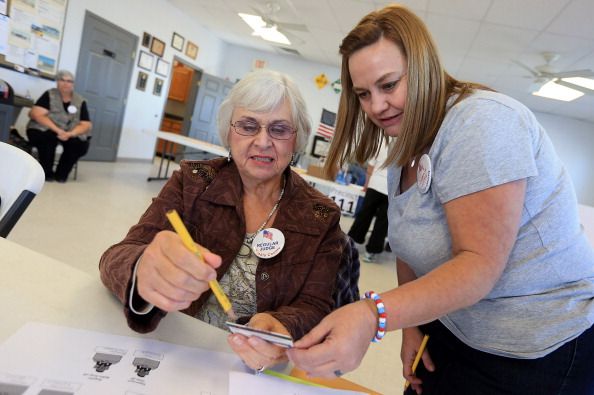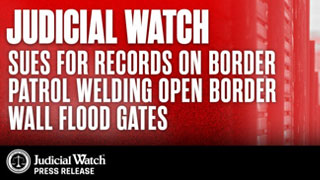

JW Brief Argues that Ninth Circuit Court of Appeals Erred in Ruling Arizona Proposition 200 Violates NVRA


Brief Argues that Ninth Circuit Court of Appeals Erred in Ruling Arizona Proposition 200 Violates National Voter Registration Act
(Washington, DC) – Judicial Watch announced today that it filed an amicus curiae brief (State of Arizona, et al. v Inter Tribal Council of Arizona et al. (No. 12-71)) on December 14, 2012, with the United States Supreme Court challenging the decision by the U.S. Court of Appeals for the Ninth Circuit declaring that Arizona’s Proposition 200, requiring proof of citizenship in order to register to vote, violated the National Voter Registration Act (NVRA). Judicial Watch filed the amicus brief on behalf of former Arizona State Senator Russell Pearce, the driving force behind Prop 200, also known as the Arizona Taxpayer and Citizen Projection Act.
Proposition 200, passed in 2004 with 56% of the vote, provides that state election officials “shall reject any application for registration that is not accompanied by satisfactory evidence of United States citizenship.” Such evidence can include a driver’s license, a photocopy of a birth certificate or passport, naturalization documents, or “other documents that are meant as proof that [may be] established pursuant to” federal immigration laws.
On April 17, 2012, the Ninth Circuit ruled that voter registration provisions of Arizona’s Proposition 200 violated certain provisions of the National Voter Registration Act of 1993. On October 15, 2012, the Supreme Court agreed to hear Arizona v. Inter Tribal Council, a challenge to Proposition 200.
With its amicus curiae brief Judicial Watch maintains that the Ninth Circuit erred when ruling that the NVRA “accept and use” provision prohibited states from requiring additional documentation:
The NVRA also does not provide that it is the exclusive authority on eligibility verification or that, as the Ninth Circuit contended, “Arizona’s only role was to make [the Federal] [F]orm available to applicants and to ‘accept and use’ it for the registration of voters.” [Emphasis added] The language of the statute not only does not prohibit additional documentation requirements, it permits states to “require . . . such identifying information . . . as is necessary to enable the appropriate State election official to assess the eligibility of the applicant . . .” Besides express authorization for a state to “develop and use” a form compliant with the statute’s criteria, the NVRA also provides that “each State shall establish procedures to register to vote in elections for Federal office . . .”
Judicial Watch further argues that, “The Ninth Circuit also failed to give any weight to the stated goal of the NVRA to ‘protect the integrity of the electoral process’ and ‘enhance the participation of eligible citizens as voters in elections for Federal office’ as guiding purposes of the statute. [Emphasis added] Under no sensible reading of the statute is the goal of election integrity advanced by allowing non-citizens to vote.”
In an October 21, 2012, story on the importance of the pending Supreme Court ruling, UPI said that “an eventual Supreme Court decision will help shape the voting landscape of the future … Seventeen states have enacted laws requiring the presentation of a government-issued photo identification, such as a driver’s license. The leftwing Brennan Center for Justice said those 17 states account for 218 of the 270 electoral votes needed to win the presidency. If the laws are implemented, the center said, millions of voters would be affected.”
“There is no coherent reason for refusing to allow states to check voter identification other than a desire to circumvent the law and let non-citizens determine the results of American elections,” said Judicial Watch President Tom Fitton. “The people of Arizona, and every other state, have the right to protect the sanctity of the ballot box. If the Supreme Court sustains the Ninth Circuit ruling, the electoral process will be rendered irrelevant. And I note the Holder Justice Department intervened against Arizona at the last minute in this litigation. It is becoming increasingly clear that the Obama administration is perfectly happy to allow ineligible aliens – both legal and illegal – to vote in our election.”
“The Ninth Circuit Court ruling ignores the rule of law, common sense and states’ rights. This court is apparently okay with illegal votes or non-citizens voting. This ruling absolutely flies in the face of common sense and ignores the will of the people of Arizona, who overwhelmingly passed Proposition 200 in 2004. The Justice Department had given Arizona’s Proposition 200 a thumbs-up and found no conflict with the Voting Rights Act of 1965. I am pleased this case is finally going to the Supreme Court where we expect to win as we did with the Legal Arizona Workers Act in 2011 and SB1070 in 2012,” said Sen. Russell Pearce of Mesa, author of Proposition 200.
Independent research published by the non-partisan Pew Charitable Trust in February 2012 indicated that approximately 24 million active voter registrations throughout the United States – or one out of every eight registrations – are either no longer valid or are significantly inaccurate.
As part of its 2012 Election Integrity Project Judicial Watch conducted an investigation demonstrating that voter rolls in the following states contained the names of individuals ineligible to vote: Mississippi, Iowa, Indiana, Missouri, Texas, Ohio, Pennsylvania, West Virginia, Florida, Alabama, and California. Judicial Watch put these states on notice that they must clean up their voter registration lists or face Judicial Watch lawsuits. Judicial Watch and True the Vote subsequently filed lawsuits against election officials in Indiana and Ohio, and prompted the state of Florida to purge its registration lists of ineligible voters.
The Obama Justice Department pressured states to register greater numbers of voters on public assistance in 2012, while ignoring a stipulation in the NVRA requiring states to clean up voter registration lists. The Justice Department has also opposed voter ID laws and other election integrity measures.
Judicial Watch previously represented former Arizona State Senator Pearce in support of another piece of legislation he authored, SB1070, Arizona’s tough illegal immigration enforcement law. The Supreme Court upheld key provisions of that law on June 25, 2012.














